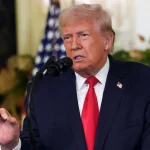
Dec. 16 will mark the 250th anniversary of the Boston Tea Party.
On that date in 1773, dozens of patriots boarded three vessels and dumped 340 chests of East India Company tea into Boston Harbor. In so doing, they committed perhaps the most important act of civil disobedience in American history.
To help commemorate the anniversary, we have compiled seven things you might not know about that dramatic event and its consequences.
The Tea Party, of course, remains an enduring symbol of defiance. Fifteen years ago, for instance, modern-day progressives bent on expanding the power of the federal government met resistance from a libertarian-conservative political movement calling itself the “Tea Party.”
The items on our list, however, are designed to help readers better understand why the original Tea Party happened and what it meant to contemporaries.
In light of that mid-December anniversary, readers might wonder why this story appears in late November. Well, the first item on our list will explain why.
The Clock Began Ticking in Late November
The ship Dartmouth, carrying 114 chests of East India Company Tea, arrived in Boston harbor on Nov. 28, 1773. At that point, the countdown to the Tea Party began.
According to an act of Parliament made applicable to the colonies in 1696, customs officials could seize any goods on which taxes had not been paid within 20 days of the carrying vessel’s entrance into the harbor. That 20-day window would expire on Dec. 17.
In short, a potential showdown loomed. Customs officials, backed by a regiment of British troops, might opt to seize the tea. If that happened, Boston’s patriots could no longer prevent the tea shipment’s consignees from paying the required tax.
Thus, a legal and political logic lay behind the Tea Party’s date. Above all, the patriots — led by Samuel Adams’ “Sons of Liberty” — did not want that tax paid. And they had only 20 days to prevent it.
An East India Company Bailout
Objections to government bailouts helped give rise to the Tea Party as a political movement in the 21st century. The same dynamic contributed to the original Boston Tea Party.
In the 18th century, the East India Company emerged as one of the most important and powerful institutions in Britain. By 1772, however, the Company had fallen on hard times.
Since the British government drew substantial revenue from customs taxes on the Company’s trade, Parliament took action. Under the Tea Act of May 1773, the Company received significant advantages. In short, Parliament positioned the Company to unload warehouses full of tea by selling it in the American colonies.
Ominously, however, British Prime Minister Lord North refused to eliminate the tea tax to which colonists had objected since 1767.
“No doubt there are political reasons” for maintaining the tax, Lord North said during Parliamentary debates.
“I know the temper of the people there is…little deserving of favor from hence, unless the reasons are very great,” he added.
As historian Benjamin Woods Labaree has put it, Lord North thus “unwittingly hammered a nail in the coffin of the old British Empire.”
“Manly Opposition”
Boston’s patriots viewed the Tea Act as part of a decade-long conspiracy. British officials, they surmised, had bailed out the East India Company as part of a plan to make the colonists submit to direct Parliamentary taxation.
Like the conspiracy theorists of today, the patriots had good reason for suspicion. After all, Lord North had confirmed the Tea Act’s “political” aspect during Parliamentary debates.
Preoccupied with defending their liberties — and not at all concerned with “gendered” conceptions of this or that nonsense — Boston’s patriots resolved never to submit.
On Monday, Nov. 29, 1773, Bostonians awakened to notices, posted all over town, alerting them to a meeting that morning.
“Friends! Brethren! Countrymen! The Hour of Destruction or Manly Opposition to the Machinations of Tyranny stares you in the Face,” the notices read.
Not many Bostonians ignored such notices. Contemporaries estimated thousands of attendees at political meetings in the ensuing weeks. In the early 1770s, Boston had slightly more than 15,000 inhabitants.
A Long History of Conflict between Boston and the Mother Country
For more than a century before the Tea Party, British officials had regarded Bostonians as the Empire’s black sheep.
A “Great Migration” of English Puritans to Massachusetts Bay and surrounding New England colonies occurred in the 1630s. Then, in the 1640s, forces loyal to England’s Puritan-dominated Parliament fought a civil war against King Charles I and his “Cavaliers.” The Puritan rebels prevailed, resulting in the king’s January 1649 execution.
In the “Restoration” year of 1660, however, the late king’s son — King Charles II — returned to the throne. A flurry of empire-building ensued. In the coming decades, the English established colonies in New York, East and West Jersey (what became New Jersey), Pennsylvania and the Carolinas.
Meanwhile, in the eyes of imperial officials, Puritan New England and its major town of Boston remained suspect. These were, after all, the descendants and spiritual compatriots of those who had executed the king’s father.
Gradually, therefore, the empire took control. Massachusetts Bay lost its self-governing charter in 1684. Two years later, the short-lived Dominion of New England brought the entire region under one administrative head. In 1691, a new charter imposed direct royal government.
Bostonians never quite rested comfortably under this new arrangement. Indeed, Puritan minister Jonathan Mayhew’s legendary 1750 sermon denouncing King Charles I as a tyrant — 100 years after the king’s execution — showed that New Englanders had not forgotten the civil war of the previous century and all that followed.
Thus, while modern Americans rightly view the Tea Party as the event that helped trigger the American Revolution, contemporaries viewed it as part of a story that stretched 150 years into the past.
“The Mohawks Are Come!”
On the night of the Tea Party, dozens of patriots marched to the harbor dressed as Mohawk Indians. Witnesses later recalled some men shouting “The Mohawks are come!” But no one has ever really explained why.
Disguises, of course, made plenty of sense. After all, those who dumped tea into the harbor certainly did not want British authorities to recognize them.
But why the Mohawks? In light of those disguises and of the Revolution’s eventual success, many men in later years claimed to have participated in the Tea Party. Amid all those stories — some fabricated and many others no doubt embellished as years passed — one would think that a plausible explanation for the specific choice of disguise would have surfaced.
Oddly enough, it is possible that the men of the Tea Party meant their disguises as a partial tribute. Like Mayhew and many others, they knew their history.
In 1675-76, the combined forces of the Wampanoag and Narragansett tribes inflicted heavy casualties on New Englanders in what became known as “King Philip’s War.” Those attacks devastated the region.
The tide turned in 1676 when Mohawk warriors from New York entered the conflict on New England’s side. It would be no exaggeration to say that the Mohawk intervention saved New England from calamity.
In short, we remember the Tea Party with fondness 250 years later, so the men who dumped tea into the harbor that night might have recalled the Mohawks with similar fondness less than a century after King Philip’s War.
John Adams’ Reaction
John Adams — future signer of the Declaration of Independence and 2nd president of the U.S. — played no direct role in the Tea Party itself. He did, however, leave a memorable recollection of the event.
In a letter to James Warren dated Dec. 17, 1773, the future Founding Father expressed approval and exhilaration.
“The Dye is cast: The People have passed the River and cutt away the Bridge: last Night Three Cargoes of Tea, were emptied into the Harbour. This is the grandest, Event, which has ever yet happened Since, the Controversy, with Britain, opened!” Adams wrote.
“The Sublimity of it, charms me!” he added.
Ironically, in the weeks preceding the Tea Party, Francis Rotch — 23-year-old son of Dartmouth owner Joseph Rotch — had sought legal advice from Adams on how best to proceed in light of the law and the public mood. We do not know the outcome of that consultation. It is possible, however, that Adams advised Rotch of the danger of allowing his ship to leave the harbor without a clearance from imperial officials.
Otherwise, perhaps Rotch would have sent the Dartmouth out of the harbor. Then, perhaps the other ship owners would have done likewise, in which case the Tea Party would never have happened.
Reverberations
Though independence lay two-and-a-half years in the future, the Boston Tea Party marks the moment at which the American Revolution really began. From then onward, Anglo-American relations deteriorated beyond the point of no return.
Of course, it did not have to be that way. Parliament could have yielded and given up its claim to authority over colonial affairs. In hindsight, it should have done exactly that.
Instead — a corrupt governments do with regularity — Parliament doubled down on oppressive legislation. The Boston Port Act of 1774 imposed a naval blockade designed to strangle the city’s trade and, in effect, starve Bostonians into submission.
Throughout the colonies, Boston’s cause became the common cause. Americans raised subscriptions for Boston’s material relief. And this humanitarian effort helped strengthen an emerging American identity.
Then, in September 1774 — prompted by universal alarm over the Port Act and other tyrannical pieces of legislative revenge — delegates from 12 of 13 colonies met in Philadelphia at the First Continental Congress.
The Second Continental Congress, which gathered in May 1775, adopted the Continental Army and placed Gen. George Washington in command. That Congress also later adopted the Declaration of Independence.
Thus, we cannot even begin to speculate about what might have happened had there been no Tea Party. Too many momentous events followed.
Indeed, something else might have emerged in its place — perhaps even something bearing the same name — but the United States of America as we know it would not exist had the Boston Tea Party never occurred







